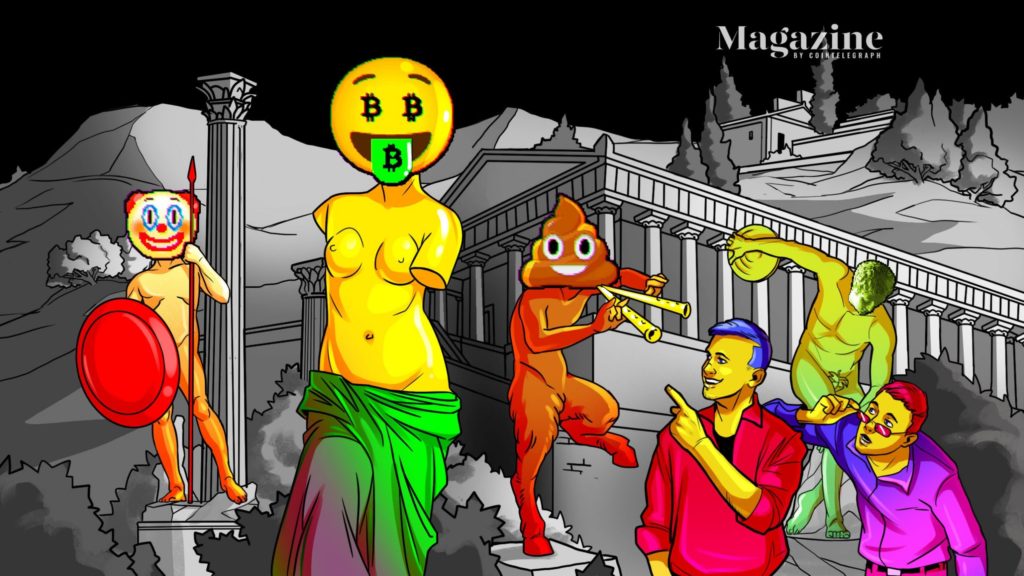NFTs: Overpriced crap or new art history?

Its been a heady few weeks for commerce and art.
Surely a revolution is afoot and were too mired in the hot mess to see it right.
With that proviso, here are two notes from the front lines.
NFTs are cutting-edge, digital art aint
Some folks say the non-fungible token (NFT) that allows a digital artwork to be possessed exclusively by a purchaser is traceable to the creation of Colored Coinsin 2012 or to CryptoPunks in 2017 even though the this market exploded just the other day.
 A page from Jules Antoine LissajoussA Study of the Optical Representation of Sound Vibrations, 1957
A page from Jules Antoine LissajoussA Study of the Optical Representation of Sound Vibrations, 1957
But digital art (DA) itself has an older pedigree.
As early as 1857, the Frenchman, Jules Antoine Lissajous (18221880) published images of mathematically-designed Lissajous Figures by capturing lines created by sound harmonies with a camera. These figures had been identified 42 years earlier by the American, Nathaniel Bowditch (1773 -1838) its just that Bowditch didnt render them as pictures.
The first art piece fully recognized as computer-made, and hence, digital, was Oscillon 1 made in 1950 by the American computer scientist Ben Laposky (19142000). He called these pieces Oscillons or Electrical Compositions. They were Lissajous Figures of a complex type. A 1953 show of his work in Cherokee, Iowa designated them electronic abstractions.
 Ben Laposky, Oscillon 45, 1952
Ben Laposky, Oscillon 45, 1952
Laposky inspired other digital artists, producing the mediums first major show in 1965, in Stuttgart, headlined by Frieder Nake (b. 1938) and the first museum show, Cybernetic Serendipity, at Londons Institute of Contemporary Arts three years later.
DAs emphasis on geometric abstraction piggy-backed on the worlds excitement for Pollock and the swarm of Abstract Expressionists roiling the cultural waters of that day. The optical gamesmanship and clean rendering of DA designs also lent momentum to early 1960s Op Art.

Op Art: Frank-Stella, Untitled, 1966
DAs entrancement with crisp linearity, geometry, and images categorized by number persists to this day.
Major digital art collections exist at the Whitney, MOMA, the Walker Art Center, and other juggernauts of the art world; and over a dozen museums dedicated to digital art now exist from Zurichs MuDa, to Tokyos Mori Museum of Digital Art, to the Center for Digital Art in LA.
NFT Pics: Easy on the Eyes, But not Museum-Ready
Beeple (Mike Winkelmann at beeple-crap.com the man who created the $69 million Everydays) said were witnessing The next chapter of art history.
I differ.
New chapters of art history are written by artists make making new art.
But this is a chapter being written by artists (and their advocates) making novel financial moves.
This is a new chapter in financial history.
 Piero Manzoni, Artists Shit, 1961
Piero Manzoni, Artists Shit, 1961
Its true, Damien Hirst and others have performed financial acts as aesthetic ones. Artists have sold air, shit, and invisibility as conceptual advancements, but thats not whats happening this month.
When this art is attached to an NFT and sold for piles of crypto, its not showcased it as an artistic performance.
Heaps of new market fluidity are is being leveraged, but no fresh aesthetic concepts is are shaping the action.
As of this writing, the overwhelming majority of images moving into NFT collections for slag-heaps of Ethereum are more akin to 1950s paperback covers than the digital art productions that have migrated to museums and marquee galleries for years.

Beeple, Infinity and Beyond, 2015
Though its main inspiration is anime, computer games, and comic books, this NFT-drop will surely persist in the field of cultural reference for decades, and, I will confess, there IS an art-historical development here, but I dont think its the one Beeple is thinking of.
This moment is an A-bomb explosion in the larger fragmentation and recombination of kitsch and high art thats been going on for one long, bloody D-Day since Andy Warhols first art show in 1962.
We can point to Toulouse Lautrec (1864 -1901), Stuart Davis (1892 -1964), and handy Andy (1928 -1987) as the dudes who threw the first blow, but the master bomb-maker in todays fractured landscape is certainly Brian Donnelly (b. 1974), better known as the comic-figure maker, KAWS (. . . with apologies to Takashi Murakami).
 KAWS, Small Lies, 2020
KAWS, Small Lies, 2020
Its true, this could be a new eruption of low-brow taste (as folks have said of the emergence of KAWs and Warhol), but I dont think thats the case.
Theres just a whole tuna school of new-money millionaires splashing around the planet who are used to Neuromancer–style imagery and theyre buying whatever they like.
Its no art revolution.
Its no change in taste.
Its just the emergence of some delightfully new destinations for loads of disposable income.
That said, Im confident that a cultural counterweight of historical artists will be joining marquee first-adopters like Kenny Scharf in the NFT market any minute now.
At the rate things are evolving, Ill bet my bottom Bitcoin that as these wild, explosive, and strangely historical weeks round out the month, blockchain moneywill begin to chase higher-grade art commodities, just as it now chases CryptoKitties, video snippets, and original tweets.








